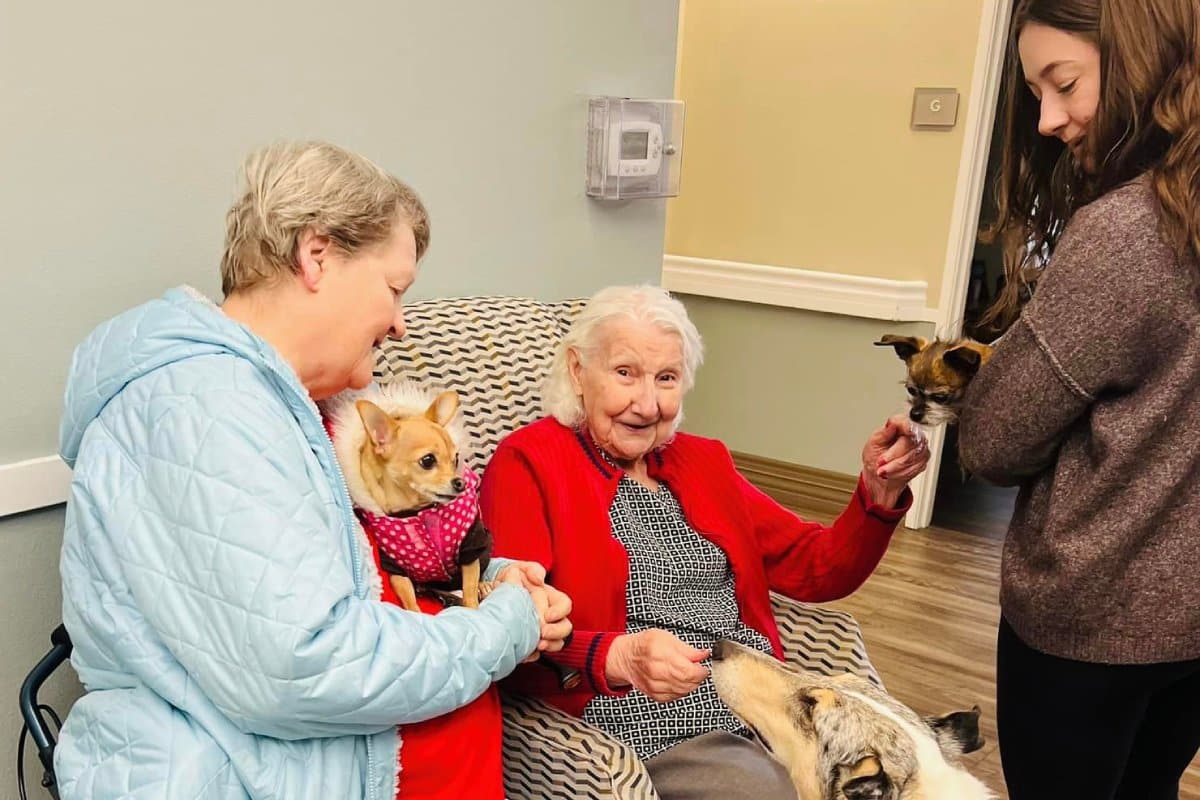Caring for a loved one with memory loss is tough. As dementia progresses, we face many hard choices. One of the biggest challenges is knowing how to talk to them.
When communicating with a person with dementia, it’s crucial to:
- Keep things simple and clear
- Avoid using complex sentences or abstract concepts that might confuse them
- Maintain eye contact
- Use a calm and gentle tone
- Be patient
Listening actively and validating their feelings is essential, as is showing respect and empathy for their experience. Correcting them harshly or arguing can lead to distress and agitation for you and your loved one.

Navigating these conversations requires a delicate balance. You want to ensure your loved one’s dignity while managing their changing perception of reality. This brings us to a controversial topic.
When is it okay to lie to a senior with dementia? Let’s explore ethics in dementia care.
Understanding Dementia and Changing Perceptions
People living with dementia, including Alzheimer’s, undergo significant changes in the brain that affect more than just short-term memory. It can alter a person’s ability to:
- Communicate
- Reason
- Understand the world around them
Over time, individuals may experience personality and behavior changes, have language difficulties, and struggle to perform everyday tasks.
As dementia progresses, it doesn’t just erase recent memories. It can distort a person’s sense of reality, leading them to live in an alternate version of the present. The damage to their brain affects how they perceive their surroundings, interpret information, and recall past events. For instance, they might believe they live in a different period or not recognize their home.
Living in an Alternate Reality
An example of this alternate reality could be a person with dementia insisting they need to go to work despite having retired years ago. They might wake up each morning, prepare for their day, and become confused or agitated when told they no longer work.
Another common scenario is when someone with dementia repeatedly asks for a deceased spouse or parent, genuinely believing they should be there. In their mind, these loved ones are still part of their daily lives.
This shift into an alternate reality is often a way for individuals with dementia to make sense of their world. It’s a coping mechanism that fills the gaps left by their failing memory and cognitive decline.
Arguing or trying to correct their misconceptions usually results in confusion and distress. Instead, healthcare professionals often recommend entering their reality, a practice known as validation therapy. This approach involves acknowledging their feelings and responding to their concerns in a way that minimizes stress and anxiety, thereby supporting a better quality of life.
The Ethics of Lying to Dementia Patients
Lying to someone with dementia, often termed “therapeutic lying,” poses a nuanced ethical dilemma. While entering a person’s altered reality can indeed reduce their immediate distress, it’s important to acknowledge that lying is still lying.
Over time, this practice may lead to confusion, especially in moments of clarity, and strain the trust and relationship between the patient and caregiver.
This complexity has led caregivers and professionals to explore alternative communication strategies that honor the truth while providing comfort and reducing agitation. Two such approaches are reflection and redirection.
Reflection and Redirection Techniques
Reflection involves acknowledging the person’s feelings and statements without directly affirming the distorted reality or lying.
For example, a person with dementia might express worry about a deceased family member not coming home. Instead of saying, “They’re just out at the store,” you might reflect by responding, “It sounds like you’re missing them right now. Tell me more about what you loved doing together.” That validates their emotions without reinforcing the inaccurate belief.
Redirection gently shifts the conversation or activity towards something positive and engaging without directly contradicting the person’s beliefs.
For instance, if an individual insists on going to work, a caregiver might redirect by saying, “I see you’re ready for a busy day. Before that, how about we go for a walk or look at some photos together?” This approach moves the focus away from the point of contention while respecting the person’s sense of purpose.
Practical Alternatives to Lying for Home Caregivers
1. Using Familiar Activities: If the person is fixated on a particular idea or task, introduce a related activity they can engage in. For example, if they want to “go to the office,” organizing papers or a desk area at home might be a soothing substitute.
2. Creating Memory Books: When a person with dementia misses a loved one, browsing through a photo album or memory book together can provide comfort. It acknowledges their emotions and memories genuinely, avoiding the need for deceit.
3. Engaging in Music and Art: Redirecting their focus to music or art provides sensory stimulation that can soothe and distract from distressing perceptions. Playing their favorite songs or drawing together can create a peaceful environment and momentarily avoid confusion.
By employing these techniques, caregivers can balance by alleviating distress and upholding honesty within their interactions.
The ethics of memory care: Do team members lie to dementia patients?
Here is an essential question about dementia care ethics: Do memory care community caregivers resort to lying to comfort residents with dementia?
The truth is that professionals staff these long-term care facilities, communities, and nursing homes. They undergo specialized training and possess qualifications that make them experts in caring for individuals with dementia. That expertise equips them with a toolkit of strategies and approaches designed to support residents effectively without the need for deceit.
Specialized Techniques and Training
Memory care ethics emphasize respecting the dignity and individuality of each person with dementia. Trained team members use communication techniques that avoid confrontation and reduce anxiety. These techniques may include therapeutic fibbing only as a last resort and when it’s in the best interest of the resident’s emotional well-being.
However, their primary strategies involve:
- Redirection
- Validation
- Engaging activities that provide comfort and a sense of purpose
Memory care professionals deeply understand the progression of cognitive impairment and how it affects behavior. That allows them to anticipate needs and respond to confusion or agitation in ways that provide reassurance without lying to a person with dementia.
A Typical Day in a Memory Care Community
A day in a memory care community is carefully structured to provide a comforting routine for residents while incorporating elements of choice and spontaneity to stimulate engagement.
Mornings might begin with caregivers assisting residents with personal care routines, followed by a communal breakfast during which residents socialize in a relaxed setting.
After breakfast, the day unfolds with a mix of activities designed to suit the diverse interests and abilities of the residents. These could include:
- Gentle exercise classes
- Music therapy sessions
- Art projects
- Sensory stimulation activities like gardening
Each activity is intended to evoke positive emotions, facilitate social interaction, and reinforce personal identity and memories.
Throughout the day, team members employ their training to interact with residents in ways that affirm their feelings and experiences. If a resident becomes distressed or confused, caregivers are skilled in using non-deceptive methods to soothe and redirect the resident’s attention.
Mealtimes and evening routines are similarly structured to provide consistency and reassurance, with team members always offering personalized support. Nighttime routines promote relaxation and a sense of security, helping residents wind down for a restful night.
Upholding Ethics: The Connections Memory Care Program
At North Point Village, understanding the ethical challenges of caring for older adults with memory loss is at the heart of our Connections program. Designed to ease the lives of the decision-maker and their loved one as dementia progresses, this innovative approach emphasizes a Connect, Move, Learn sequence.
By fostering meaningful connections, encouraging physical movement, and stimulating cognitive learning, we aim to slow the progression of memory loss in persons with dementia. Our program offers relief to families, knowing their loved ones are receiving compassionate, long-term care that respects their dignity while navigating the complex ethical issues of dementia care.
Discover how our Connections program can make a positive difference for your family. Contact us for evidence-based memory care in Spokane, WA.





